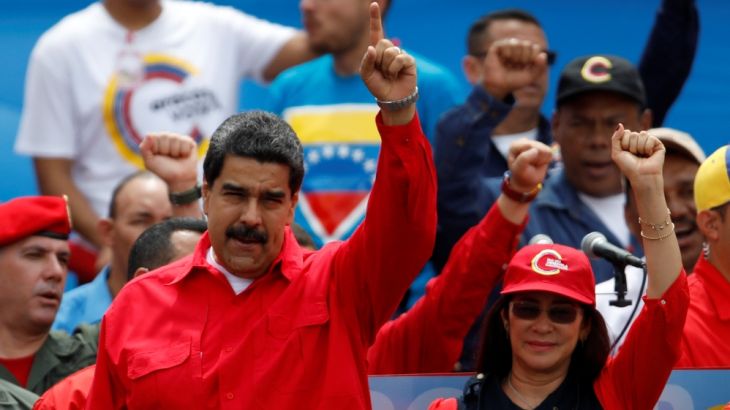Venezuela crisis: What’s next?
Government supporters hope the new Constituent Assembly will restore peace but opponents consider it undemocratic.

After months of protests that have left more than 120 people dead, the Venezuelan president, Nicolas Maduro, has been celebrating victory in an election to pick a controversial new body.
The 545-member Constituent Assembly will have the power to amend the Constitution.
The government-allied National Electoral Council said that more than eight million people had voted in the July 30 election, but this figure has been disputed by the opposition and the firm that provided Venezuela’s election technology.
The former foreign minister, Delcy Rodriguez, a close ally of Maduro, has been elected president of the assembly. In her opening speech, she called the opposition “fascists” and warned the international community not to interfere in Venezuela’s domestic affairs.
“For those who preach violence, to the fascists, to those who wage an economic war against people … justice will come to them,” Rodriguez said.
The day after it was inaugurated, the new body voted to remove the country’s dissident attorney general, Luisa Ortega, after security forces surrounded the entrance to her office in the capital, Caracas. The one-time government loyalist turned vocal government critic had said the assembly was fraudulently elected.
So what is next for the country? We asked experts on Venezuela to explain.
READ MORE: What is a Constituent Assembly?
Politics: ‘Fragmentation’ and ‘radicalisation’
“In the immediate future, we will see the fragmentation of the state,” says Ronal Rodriguez, a professor and researcher at the Venezuelan Observatory, a think-tank at the University of Rosario in Colombia.
“Part of the population, represented by the opposition, will follow the constitution of 1999, while the ruling party, which has the support of the armed forces, will seek a reform [of the Constitution] and will aim to change the rules of the game.”
In the next six months or year, we will see a period of radicalisation
Javier Buenrostro, a professor at the National Autonomous University in Mexico, believes that over the next six months or year, “we will see a period of radicalisation” by the government.
“[The] Constituent [Assembly] will work to clean out the [government’s] opponents, but not only from the opposition. [Also] people within the government, many of them Chavistas,” he says, referring to supporters of Maduro’s predecessor, Hugo Chavez.
“This is a battle to take it all,” he adds. “Both the opposition and the government are betting [on] two [different] models of development.”
Reinaldo Silva, a lawyer and member of the Constituent Assembly, says: “In Venezuela, we seek peace with the [establishment of the] Constituent Assembly. Now we are going for justice, we are going to reform part of our legal system ….”
Economy: ‘These are hunger protests’
Venezuela’s government is running out of cash. The country has approximately $10.4bn in foreign reserves left and is estimated to have debts of $7.2bn. Food has become scarce. And the US president, Donald Trump, is reportedly considering imposing sanctions on Venezuela’s oil industry, the country’s only source of revenue.
”The
shortage will continue to grow, and therefore the inflation on food prices, too”]
“This will continue to worsen,” says Venezuelan sociologist Jose Antonio Gil.
He says the government has focused on importing seeds but that they have imported too few, too late and that their quality is poor.
“It is already known that the [food] shortage will continue to grow, and therefore, the inflation on food prices, too,” he adds.
“If the government continues implementing these measures, with or without the opposition, they will end up being destabilised. These are hunger protests.”
Last week, Venezuela’s bolivar currency dropped 18 percent against the US dollar on the black market.
“We will have to work together – pensioners, students, housewives. Working all together is the only way forward,” reflects Rossana Melendez, a Venezuelan environmentalist.
READ MORE: Venezuela’s worst economic crisis – What went wrong?
What’s next?
Reconciliation between the government and the opposition does not appear likely in the short term. But analysts say the two will have to acknowledge each other.
“The opposition will have to consider Chavismo as a democratic force and it will need to have spaces where it can aspire to power,” says Rodriguez. “Hugo Chavez managed to motivate people to participate in political issues, he managed to make them part of the proceedings, and all those spaces can not be cancelled.”
But, for now, neither show any signs of backing down. And with no resolution in sight, many Venezuelans are left questioning whether they should stay in the country or attempt to leave.
Last year, there were 27,000 Venezuelan asylum seekers worldwide. So far in 2017, more than 52,000 have applied for asylum, according to UNHCR.
The main countries of destination for Venezuelan asylum seekers this year have been the US, Brazil, Peru, Spain and Mexico.